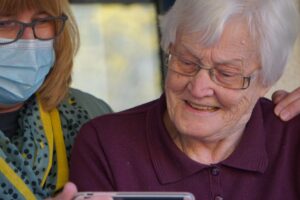
Essential Dementia Care Tips for Creating a Supportive Environment
When a loved one shows signs of dementia, your first instinct might be to look for a care facility in...
Read More

When a loved one shows signs of dementia, your first instinct might be to look for a care facility in...
Read More
When you’re looking into care options for yourself or a loved one, there are a lot of factors to consider....
Read More
Many of our home care clients in Toronto suffer from memory loss, and some have dementia or Alzheimer’s disease. One...
Read More
A few years ago, I went to a screening of the movie, Alive Inside, hosted by one of our sister...
Read More
A stroke is a stressful life event. Recovery requires time in hospital, and then most likely a rehabilitation center. Strokes...
Read More
Craig Fossay, Owner ComForCare North York Families in North York need the services of home care agencies every day. Recent...
Read More
Craig Fossay, Owner ComForCare North YorkJune 8, 2020 The COVID-19 virus has had many adverse consequences. One group that has...
Read More
The renderer is stuck in an inifite loop, because...'post' with ID 1492 renders 'post' 1492 (edit)And so on... a 'post'...
Read More
We’re so excited and we just can’t hide it! ComForCare is turning 30. Our story began in Bloomfield Hills, Michigan...
Read More
Falls are the leading cause of injury among older Canadians, with 20-30% seniors experiencing one or more falls each year....
Read More
As our parents age, changes in balance, strength, and reaction time can make everyday tasks more risky. In Canada, falls...
Read More
As we age, what we eat matters more than ever. Eating a variety of vegetables and fruits, whole grains, and...
Read More
Did You Know? As of 2023, the Canadian Chronic Disease Surveillance System (CCDSS) reported that more than 111,000 Canadians aged...
Read More
Caring for an elderly loved one often starts with small tasks — picking up prescriptions, helping with meals, driving to...
Read More
Join us on Thursday, October 30, 2025, at 2:00 PM ET for the complimentary webinar “Person-Centered Parkinson’s Care: Empowering Support...
Read More
Join us on Thursday, August 7, 2025, at 2:00 PM ET for the complimentary webinar “The Power of Partnerships: Transforming...
Read More
As of mid-2024, nearly 7.8 million Canadians, about 20% of the population, are aged 65 or older, with that number...
Read More
Since 2007, the Alzheimer’s Association has published an Alzheimer’s Facts and Figures report every year to raise awareness about this all-too-common disease....
Read More
Did you know that over 5 million people in Canada and about 37.1 million Americans are caregivers for a loved one? These caregivers support...
Read More
Over the past two decades, interest in the concept of aging in place has steadily increased. More people searched for age-in-place...
Read More
As individuals age, they often face challenges that impact their independence and overall well-being, many of which aren’t medical in...
Read More
Dementia, or the loss of memory, language, problem-solving and other thinking abilities that can interfere with daily life, touches many...
Read More
When most people hear the word “dementia,” they think of Alzheimer’s disease. Though Alzheimer’s is the most common form of...
Read More
Making decisions about at-home care for you or your loved ones is never easy. It involves choosing who you can...
Read More
Planning for the future involves more than just saving some cash here and there for a rainy day. Life is...
Read More
Lewy Body Dementia (LBD) is a challenging and often confusing condition. LBD affects many families—as many as 1.4 million people in...
Read More
Hospitalization can be emotionally and physically trying on clients. It can affect many aspects of a client’s life, including sleep...
Read More
Falls remain one of the top health risks for people over 65. In fact, according to the program director at...
Read More
When you’re looking for short-term senior care near you, it’s not unusual to feel a bit lost, especially if this...
Read More
Across cultures and generations, mealtimes are made for connection, joy, and nourishment. This is especially true for older adults. As...
Read More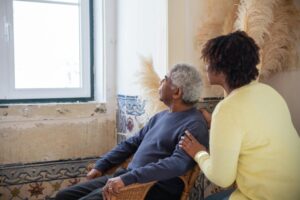
Finding the right home care service provider for yourself or a loved one can feel overwhelming. While a quick Google...
Read More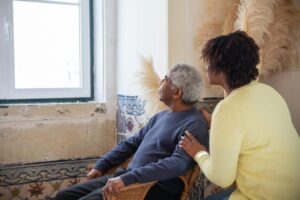
Seeing a family member deal with adverse effects of aging can be difficult, especially if they are dealing with dementia....
Read More
Promoting Independence Independence in our clients is described as social medicine. It is the ability to carry out activities that...
Read More
As we age, the bathroom can become one of the most hazardous rooms in the house. Wet floors, slippery surfaces,...
Read More
Personal Care Services: Enhancing Well-Being and Quality of Life Aging is a part of life for everyone, but how we...
Read More
Parkinson’s Spotlight Caring for a Person With Parkinson’s Disease Caregiver Tip Sheet Prior to Assignment: Agency caregivers should receive an...
Read More
Parkinson’s Disease (PD) is a progressive neurodegenerative disorder that affects movement, cognition, and emotional well-being. It’s characterized by motor symptoms—such as...
Read More
As we age, it's natural to experience some changes in memory and thinking. But when these changes become more pronounced,...
Read More
In the midst of a global pandemic, infection control is of the utmost importance, especially while working with clients who...
Read More
When friends and families are searching for a comprehensive in-home care plan for the seniors in their lives, it can...
Read More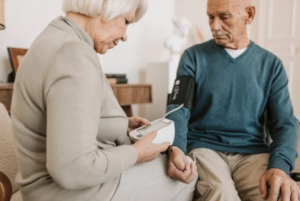
While people of all ages hire housekeeping services to assist with their busy, daily lives, for older adults, these services...
Read More
Every person cherishes their daily routine; it’s an opportunity to create order in their life and ensure all essential tasks...
Read More
When a loved one receives a dementia diagnosis, it can be challenging to know where to find the appropriate support...
Read More
When people begin exploring at-home care options for a loved one, determining a schedule is paramount. Families can find it...
Read More
"But if there’s anything the past few weeks have taught the industry — and the country as a whole —...
Read More
At ComForCare, we believe caregiving is more than just a job—it's a calling. This commitment to compassionate care is beautifully...
Read More
By Jake Baker, MM, BSN, RN, clinical informatics specialist As the days get shorter and the weather gets colder it...
Read More
Fall Prevention in Clients Important Things to Know: *Falls are not a normal part of aging. *Poor lower extremity strength...
Read More
Millions of older people fall each year, according to the Centers for Disease Control and Prevention (CDC). While younger people may not...
Read More
ComForCare/At Your Side recommends that every caregiver performs meaningful activities with their clients. At least one meaningful activity per shift...
Read More
While everyone’s care decision is personal and should be tailored to their needs, there is a certain baseline that should...
Read More
As people live longer and healthier lives than previous generations, the ageing population continues to grow. By 2052, nearly a...
Read More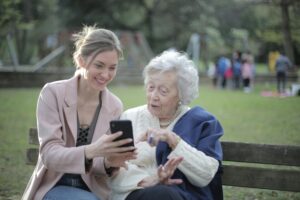
Enhancing Quality of Life: Best Practices for Care for Dementia Patients It is undeniably difficult when someone you know and...
Read More
Empowering Independence: Exploring the Benefits of In-Home Care Services for Seniors Care for older adults has evolved from how you...
Read More
It is common to have lapses in memory or changes in thinking, but if you have concerns about an aging...
Read More
Under any given circumstances, we do our best to balance the demands of keeping those we care for safe and...
Read More
Comfort Around the Clock: Navigating 24-Hour Home Care Services for Seniors & People with Dementia The decision to get 24-hour...
Read More
Seeing a loved one cope with dementia could be emotionally disturbing. As dementia progresses, it often affects a person’s ability...
Read More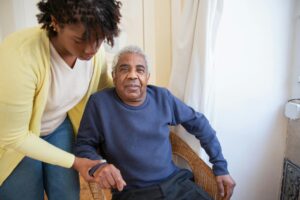
Benefits of Short-Term Home Care Services for Seniors & Their Families When people think about professional care, they often imagine...
Read More
A Comprehensive Guide to Dementia Care: Support When You Need It While aging is a natural process for us all,...
Read More
24-Hour Care for Seniors: Ensuring Safety & Well-Being Around the Clock As people age, they may need more help than...
Read More
Join us on Tuesday, June 17, 2025, at 12:30 PM EST for the complimentary webinar “Innovating Person-Centered Care: Collaborative Solutions...
Read More
In Canada, care providers play a critical role in ensuring smooth and successful transitions for clients returning home from hospitals,...
Read More
In 2022, over 13.4 million Canadians aged 15 years and older—representing 42% of the population—provided unpaid care to children, youth,...
Read More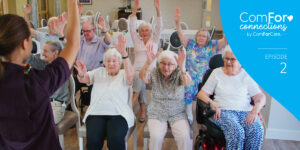
Caring for an individual with dementia requires a multifaceted approach focused on enhancing their quality of life. One particularly transformative...
Read More
Join us on Thursday, February 15, 2024 at 1:00 PM ET for a virtual session focused on best practice considerations...
Read More
Infection prevention is a critical aspect of maintaining a healthy and safe environment, especially when caring for loved ones at...
Read More
Many older adults make significant life decisions in crisis moments — but many don’t realize that doing this could harm...
Read More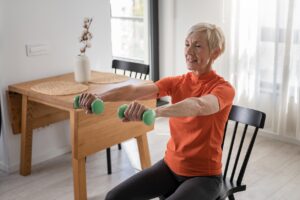
It’s a new year, and that means most of us are thinking about making healthy changes. Whether you call them...
Read More
How do I choose the right in-home care provider for my loved one’s needs? Because professional care, when done right,...
Read More
When your parent needs more extensive care than the occasional drop-in, it can get overwhelming quickly. Switching from child to...
Read More
If you have an aging loved one in your life, making the decision to seek care can be difficult. In-home care...
Read More
As our parents age, the roles we play in their lives often shift. The caregivers who once provided for us...
Read More
At the core of every great caregiving organization lies the unwavering commitment of its caregivers—those compassionate individuals who dedicate their...
Read More
Whether you or your loved one has had an unexpected accident, a major health event such as stroke or heart...
Read More
Dementia is a broad term for a symptom that covers a suite of symptoms. Because of this, determining when a...
Read More
As we age, everyone’s care needs are different. Some people prefer to move to a senior living community for added...
Read More
If you have an aging family member, chances are high that they want to continue living at home for as...
Read More
Are you taking care of an aging family member at home? Is an older adult in your life beginning to...
Read More
While there are many in-home care services available to seniors, ComForCare is unique in many ways, which takes your loved...
Read More
"But if there’s anything the past few weeks have taught the industry — and the country as a whole —...
Read More
Many seniors are reluctant to leave their homes and enter a retirement residence or long-term care facility yet they are...
Read More
Regardless of your situation or location, our professional caregivers are ready to help you find the right elderly home care...
Read More
Navigating the Journey of Dementia Care: Tips and Insight If a loved one is struggling with a form of dementia,...
Read More
Alzheimer’s disease (AD) is reportedly listed as the sixth-leading cause of death. This equates to one in three older adults...
Read More
The place that you call home is special. People spend years fine-tuning their home to be the perfect space for...
Read More
Good nutrition is important, no matter your age. Eating right is how your body gets vital nutrients: substances that our...
Read More
Chronic diseases—like arthritis, diabetes, dementia, and heart disease—affect seniors at an increasingly high rate. According to the National Council on Aging,...
Read More
Selecting a Care Provider: Assessing Your Loved One’s Needs When choosing a care provider, the sheer number of options can...
Read More
If you are reaching retirement age or have a loved one 65+, you may have heard the term “aging in...
Read More
Since 2007, the Alzheimer’s Association has published an Alzheimer’s Facts and Figures report every year to raise awareness about this all-too-common disease....
Read More
Millions of older people fall each year, according to the Centers for Disease Control and Prevention (CDC). While younger people may not...
Read More
Stevie Wonder once said, “Music, at its essence, is what gives us memories. And the longer a song has existed...
Read More
Being diagnosed with Alzheimer’s Disease or another form of dementia can have a heavy impact on seniors and their families....
Read More
With each year that goes by, exponentially more Canadians reach retirement age. And over half of those older adults will...
Read More
There are plenty of reasons for family members to take care of aging or disabled loved ones. The role can...
Read More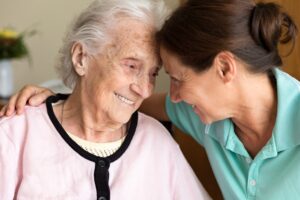
Today, almost 6 million older adults live with dementia in Canada. As the Baby Boomer population ages, that number could rise to over...
Read More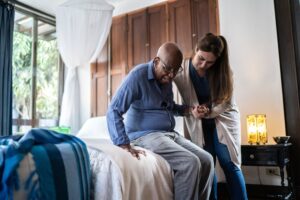
When an older relative has surgery, they’re entering a vulnerable time. They’ll need extra support after coming home from the...
Read More
August 21 is World Senior Citizen’s Day, a day where communities across the globe celebrate the achievements, contributions, and rights...
Read More
It is estimated that up to 16% of older adults experience social isolation. According to Statistics Canada, 17.3% reported feeling...
Read More
Retirement age can be a wonderfully fulfilling time for most adults, a time when they can live happily pursuing new...
Read More
Entering older age comes with a lot of strong emotions. Turning 65 marks retirement for many: a time for rest,...
Read More
ComForCare, a franchised provider of in-home caregiving services, has recently received the honor of being named one of the 2022...
Read More
ComForCare, a franchised provider of in-home caregiving services, has recently received the honor of being named one of the 2022...
Read More
DementiaWise Spotlight: What is DementiaWise? What is the difference between Alzheimer’s & dementia? How can you become certified? Tips for...
Read More
Realizing that an elderly loved one needs assistance can be tough. Whether it’s a parent, extended family member, or special...
Read More
The coronavirus (COVID-19) fatality rate has been incredibly high, surpassing 35000 confirmed deaths. This is a trying time for all...
Read More
In this busy world it’s so easy to get wrapped up in our everyday practices. Between personal and work obligations...
Read More
Independence in our clients is described as social medicine. It is the ability to carry out activities that support one’s...
Read More
More and more states are beginning to open after relaxing rules and regulations regarding which businesses can open and how...
Read More
The holidays can be a lonely time for clients, especially with COVID-19 still rampant around us. Even without a global...
Read More
ComForCare/At Your Side recommends that every caregiver performs meaningful activities with their clients. At least one meaningful activity per shift...
Read More
Fall Prevention in Clients Important Things to Know: *Falls are not a normal part of aging. *Poor lower extremity strength...
Read More
Staying out in the heat for too long without enough liquids is a huge risk for heat exhaustion, however, there...
Read More
Parkinson’s Spotlight Caring for a Person With Parkinson’s Disease Caregiver Tip Sheet Prior to Assignment: Agency caregivers should receive an...
Read More
Being a caregiver for a family member isn’t a nine-to-five job. It’s an all-encompassing, emotionally and physically draining lifestyle that...
Read More
Bathroom Safety Spotlight: Bathing and Toileting Tips for Caregivers Many of our clients have limited mobility, and with limited mobility...
Read More
Receiving a Frontotemporal Dementia (FTD) diagnosis can leave many family members and loved ones wondering what to expect. FTD is...
Read More
In the midst of a global pandemic, infection control is of the utmost importance, especially while working with clients who...
Read More
Lewy body dementia (LBD) presents unique challenges for those living with it and their families. Many family members and loved...
Read More
Learn more about mild cognitive impairment (MCI) and dementia with our DementiaWise expert Heather McKay. Knowing some key facts and useful...
Read More
Sleep is essential for our mental and physical health in all walks of life, but many older adults struggle to...
Read More
ComForCare, a franchised provider of in-home caregiving services, is providing training and resources to caregivers through its Staying Connected Caregiving...
Read More
ComForCare, a franchised provider of in-home caregiving services, is providing training and resources to caregivers through its Staying Connected Caregiving...
Read More
Hospitalization can be emotionally and physically trying on clients. It can affect many aspects of a client’s life, including sleep...
Read More
Learn more about Creutzfeldt Jakob Disease (CJD) with our DementiaWise expert, Heather McKay What is the difference between CJD and other types of...
Read More
Mild cognitive impairment (MCI) affects approximately 15-20% of people age 65 or older, with a slight but noticeable decline in...
Read More
Receiving an Alzheimer’s disease diagnosis can leave many family members and loved ones wondering what to expect. While the disease...
Read More
As more people are living with some form of dementia, questions abound about different types of dementia, such as, "What...
Read More
Vascular dementia is the second most common cause of dementia. It's referred to by some as a "plumbing problem" in...
Read More
Adults age 65 and up and/or individuals with pre-existing health conditions (i.e. diabetes, asthma, etc.) are at the greatest risk...
Read More
Being a family member of a loved one with a Lewy Body diagnosis often leads to wondering what to expect...
Read More
Winter is here, and some of us are already experiencing those colder temperatures. As even chillier weather rolls in, seniors...
Read More
Does your senior loved one have a medical and financial power of attorney? The Canadian government urges older adults to understand...
Read More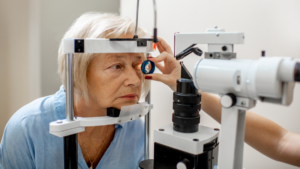
It’s the second leading cause of blindness in the world – glaucoma. It affects more and more people every year. It...
Read More
Learn more about Vascular Dementia with our DementiaWise expert, Heather McKay What is the difference between vascular dementia and all other...
Read More
For many families, the holidays are the only time they have to spend together, and COVID-19 has made that more...
Read More
“When the hospital discharged me, I was told I had to take one medication every two hours and a different...
Read More
We invite you to learn more about AD, its disease process and key facts. Understanding what lays ahead can help...
Read More
We invite you to learn more about AD, its disease process and key facts. Understanding what lays ahead can help...
Read More
Taking care of others, especially older loved ones, is a role that can be both incredibly rewarding and frustratingly challenging....
Read More
Taking care of others, especially older loved ones, is a role that can be both incredibly rewarding and frustratingly challenging....
Read More
Caregiving for an older loved one can be a difficult, stressful task, and COVID-19 has made it even more challenging....
Read More
Have you ever heard that you are the main character in your own story? For most of us, we are...
Read More
COVID-19 is a serious threat to us all, but older Canadian adults are at a high risk of experiencing serious complications. While...
Read More
Halloween isn’t just for little kids anymore and neither is dressing up. While make-believe and pretend are sometimes seen as childish...
Read More
When we take the proper precautions, we can limit the spread of the coronavirus. In addition to practicing social distancing...
Read More
When we take the proper precautions, we can limit the spread of the coronavirus. In addition to practicing social distancing...
Read More
Like shelter and food, companionship is one of the most important necessities in life. Having someone to talk to or...
Read More
Finding a home care agency to watch over a parent, grandparent, spouse or another older loved one is a serious responsibility....
Read More
By Steve Toll, care enhancement specialist When I was a kid, my mother would play the piano, and both of...
Read More
Summer is here once again, which means sunny days, hot weather, and of course, a well-deserved vacation. Unfortunately, this year...
Read More
By Steve Toll, care enhancement specialist I will never forget the first time I saw Louis Armstrong perform live at...
Read More
For children, visiting their grandparents’ house can be a fun and exciting place to explore. Not only do they get...
Read More
Steve picks up his guitar and plays tunes he’s perfected over the years. Old songs, big hits, singalongs. It started...
Read More
By Steve Toll, care enhancement specialist I have always loved to cook. I remember as a young boy watching attentively,...
Read More
We usually associate the latest technology with the young, but in the case of virtual reality, the earliest adopters seem to...
Read More
RICHMOND, Va. -- Many Americans are struggling to regain a sense of control amid our current health crisis. Caregivers face...
Read More
Handwashing is an essential practice for limiting the spread of disease and is even more critical during the COVID-19 pandemic. While...
Read More
The technology is constantly evolving -- from new emojis, to software updates that we’re not quite sure what they do....
Read More
As we look for ways to navigate back to normalcy from the COVID-19 pandemic, home-based care providers will be an essential part...
Read More
More and more adults and older adults are turning to CBD for pain relief. In 2013, Health Canada figures showed...
Read More
In light of COVID-19, it is important for all to stay vigilant and protect ourselves as best we can. While...
Read More
"They're like soldiers and it's war time. They suit up and go and they don't even think twice. We're very...
Read More
While COVID-19 is spreading rapidly throughout the population, people over 60, and especially over 80, are particularly vulnerable. In 2030,...
Read More
During this period of social and physical distancing, it can be challenging for people to stay connected to their friends...
Read More
While some family caregivers gradually grow into their roles or are born into it, others can pinpoint the event that...
Read More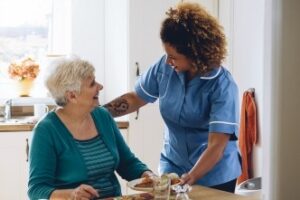
ComForCare is actively monitoring the progression of the coronavirus, COVID-19, to ensure that we have the most accurate and latest...
Read More
Most people want to age in place. A survey by the Canadian Association for Retired Persons (CARP) found 85% of Canadian...
Read More
We all feel lonely from time to time. Indeed, loneliness may actually help us to experience self-reflection and appreciation for...
Read More
My office has a sensor that turns the overhead light on and off if it senses movement or lack thereof....
Read More
ComForCare Home Care provides a variety of in-home care services such as bathing, grooming, meal preparation and light housekeeping. But,...
Read More
It has amazed me over the years of working with older adults how much artistic talent humans possess and how...
Read More
When an aging loved one’s health, safety or well-being becomes a concern, family members often need to come together to...
Read More
By Jake Baker, MM, BSN, RN, clinical informatics specialist Exercise can help you control your weight, decrease the risk of...
Read More
Walkers can help older adults and those with disabilities remain independent and safe by providing stability and assurance. If not...
Read More
By Jake Baker, MM, BSN, RN, clinical informatics specialist As the days get shorter and the weather gets colder it...
Read More
The whirl of the holiday season is behind us, and while you’re left with happy memories, you may be recalling...
Read More
By Haley Kotwicki, content specialist It’s my mom and my new tradition to watch the W Network’s Hallmark channel during...
Read More
By Steve Toll, care enhancement specialist The winter holidays are fast approaching and I have extremely fond memories of this...
Read More
If you’re researching home care agencies for an older patient or a family caregiver who needs help, you may not...
Read More
Autumn in Canada brings chilly breezes and the fiery colours of the changing leaves. And, though we may miss the...
Read More
Canadian seniors who were prescribed 10 to 14 drug classes (types of medication) were over five times more likely to...
Read More
Anyone can fall. But as we age, our risk of falling increases. This can be attributed to a variety of factors including...
Read More
Whether you’re planning your own long-term care or helping care for a loved one, there are lots of options to consider. ...
Read More
Being a caregiver has many demands – both physically and emotionally. In addition to the responsibilities of caregiving, you may deal with work...
Read More
Being a caregiver has many demands – both physically and emotionally. In addition to the responsibilities of caregiving, you may deal with work...
Read More
By Steve Toll, care enhancement specialist According to CARP, most Canadian seniors want to remain in their own homes for...
Read More
Every day at 5 a.m., I hear you wake up across the hall, unraveling yourself from the bed covers. You...
Read More
Each office is independently owned and operated and is an equal opportunity employer.
ComForCare strives to provide services accessible to everyone, please contact your local office for documents and details related to accessible Customer Service.

© 2026 ComForCare Franchise Systems, LLC.